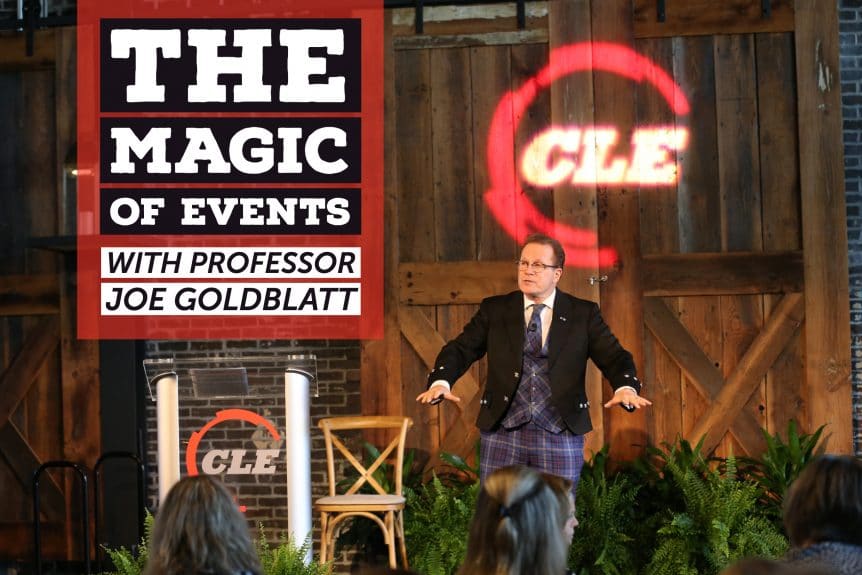Why do we love this business of live events, and how do we go about creating dynamic events without end? CLE’s Production Talks special guest speaker, Prof. Joe Goldblatt, reminded us that, “we do this for the magic and the mystery that might evolve.” He went on to emphasize, “every life is changed by the events that we plan and produce. Someone might have met and fallen in love, joined our association, or moved their corporate business,” because of an event they attended.
Prof. Goldblatt is the founding president of the ILEA (International Live Events Association), author of multiple books on live events, a university teacher for 27 years, and a 20-year veteran of producing live events for clients which included Donald J. Trump, Presidents’ Reagan and Bush, Oprah Winfrey and many other luminaries. During his talk, Goldblatt shared a world of knowledge and stories to drive home why and how to grow the live events industry in the next 20 years. We’ve pulled the highlights of his talk because it conveys the passion behind live events and encourages all of us who produce and orchestrate them.
Outcome is at the Core of Live Events
The original of the word event comes from the Latin ‘e’ and ‘venire’ meaning ‘out of’ and ‘come.’ At its core, events are all about the result or ‘outcome.’ Will your event educate, inspire, motivate, or simply solve a challenge? When we focus our research and planning on the outcome of our live events, we drastically increase the probability of success and profit. As event planners, we need to put the audience first and always work on exciting, engaging, and influencing our attendees.
Research, Goldblatt stated, strongly suggests that – “The future of live events will be harnessed by professionals who carefully aligned the needs, wants, and desires of the audience with the outcome of the event.”
Your Events Could Be Change Makers
Have you ever considered that your event could impact lives? Often we move through the controlled chaos of event planning without reflecting on where the flow of our event might create change. It may seem a grandiose goal, but Goldblatt suggests that “At the root of efforts (event management) is the opportunity to change lives for the better. In this regard, there is a need for a revolutionary approach to how we envisage modern events. Events are not only place makers… they are fundamentally change makers.”
How? Consider Harvard economists Pine and Gilmore’s conclusion that events can transform people, organizations, communities, cultures, and cities.
The most powerful and bold economic period will be one where event leaders such as yourselves, create an environment for your guests where they are literally transformed in some measurable way. –
– Harvard University Economist Pine and Gilmore
The Importance of Research & Planning
The best intentions can be soured by overlooking critical research and planning. You’ve probably experienced this as an event attendee or running the show yourself. It can be as simple as not running through the slide deck ahead of time, or not checking the audio on all mics, or assuming the speaker has a gauge of the timetable.
Expert insight from Goldblatt stressed being extra attentive to these areas, “I believe that the research and planning process for event managers directly correlates with the optimum financial success factor of all of the outcomes that you wish to achieve.
The more time invested in research before the event and the more time spent in evaluation following the event helps ensure that the rest of the phases operate more smoothly and produce a better outcome.”
This includes the importance of technology, rehearsals, and backup systems, which are essential when preparing for a successful outcome. It is also crucial to acquire the best technical support for your event. Working with experienced event production professionals will make the difference between a forgotten event and one that was memorable and had a lasting impression.
It’s Not About the Size of the Event That Matters
Big or small, every event takes lots of energy! Take, for instance, Disney’s Main Street parade, where the sizes of the crowds may vary day to day, but the attention to detail does not flex.
This misconception of event size and preparation is well illustrated by Bob Yanni, legendary producer of that Disney Main Street parade, “If you are holding a small cultivation event for 10 people the amount of planning, the amount of sensitivity, the amount of care that goes into that event, is the same as producing a Super Bowl halftime spectacular.”
The integrity of the event does not change based upon its size. – Bob Yanni, legendary producer of Disney’s Main Street parade
Create a Dynamic Experience
Think bigger! It’s hard enough to pull off a great event, let alone be revolutionary. But Goldblatt loves the industry, and his enthusiasm infectiously pushes us to be better, suggesting we can be catalysts for this new revolution of achieving greater experiences and profound transformations through live events, one guest at a time.
“I recommend that you consider this as you’re designing your events. Add as much dynamism change as possible,” he said, suggesting we move away from the accepted static experience and work with all the available resources and technology to create a dynamic experience that will transform and intrigue your attendees.
Use Technology to the Max
In an age of growing digital natives (X-Gens to Millennials), are we taking full advantage of technology to create the best possible experience? Goldblatt challenges us with ways to elevate events.
- Wireless systems for audience interaction
- Live survey polling and voting
- LED lighting to improve presentation quality, create dynamic excitement and focus, as well as reduce power usage and environmental impact
- Social media incorporated before, during and following the event to develop events-without-end genuinely
- Automated and online registration for attendee ease and comfort
- Technology to reach audiences with disabilities such as providing audio description for individuals
Anticipation, Curiosity, & Continued Connections
It’s not the day that inspires alone… its the full experience. Goldblatt leaned on the theory of planned events from Dr. Donald Getz, professor at the University of Calgary. Getz concludes that full-circle experiences journey this way:
- The event experience begins prior to the event occurring through anticipation generated by advertising, public relations, and marketing messages.
- The experience then culminates during the event itself, which is often short, but intense in terms of feelings and emotions.
- And finally, following the event, the experience continues through post-event networking and online media.
Event Production and the Never-Ending Story
Even if you missed our event with Prof. Goldblatt, the key takeaway reminds us that, “The next time you orchestrate that association meeting or corporate event remember for many it is a milestone; therefore, in my opinion, events are indeed a never-ending story.”
In fact, he inspires us to plan better, dream bigger, and view our profession as one that impacts lives in so many ways.
“You have the ability to spread your love for the magic and mystery of live events all over the world. I wish you good luck as you embark upon your journey, and I look forward to following your bright lights to see where they might take you and in turn, take all of us.” – Prof. Joe Goldblatt
Dig deeper and watch our video of his full presentation here.
Share this Post

